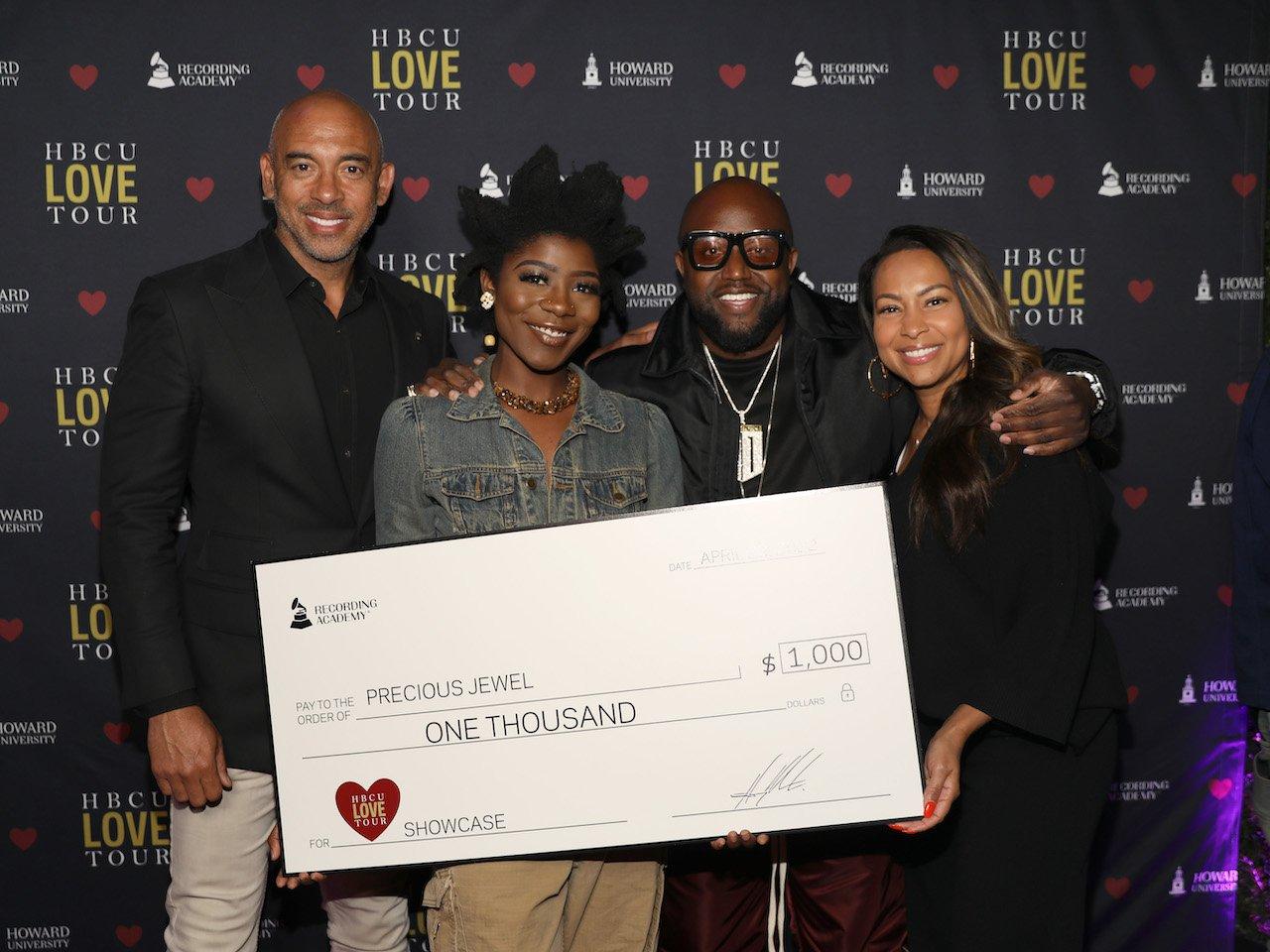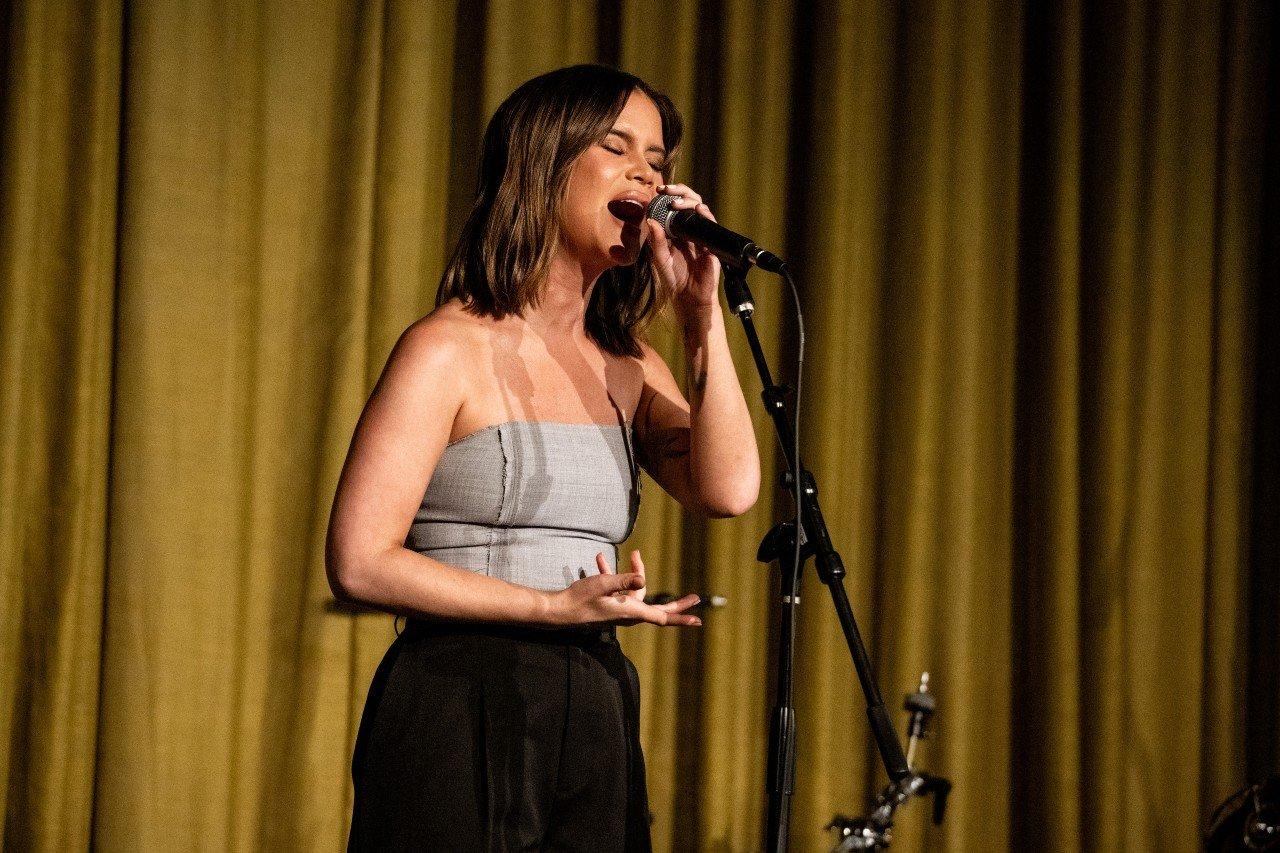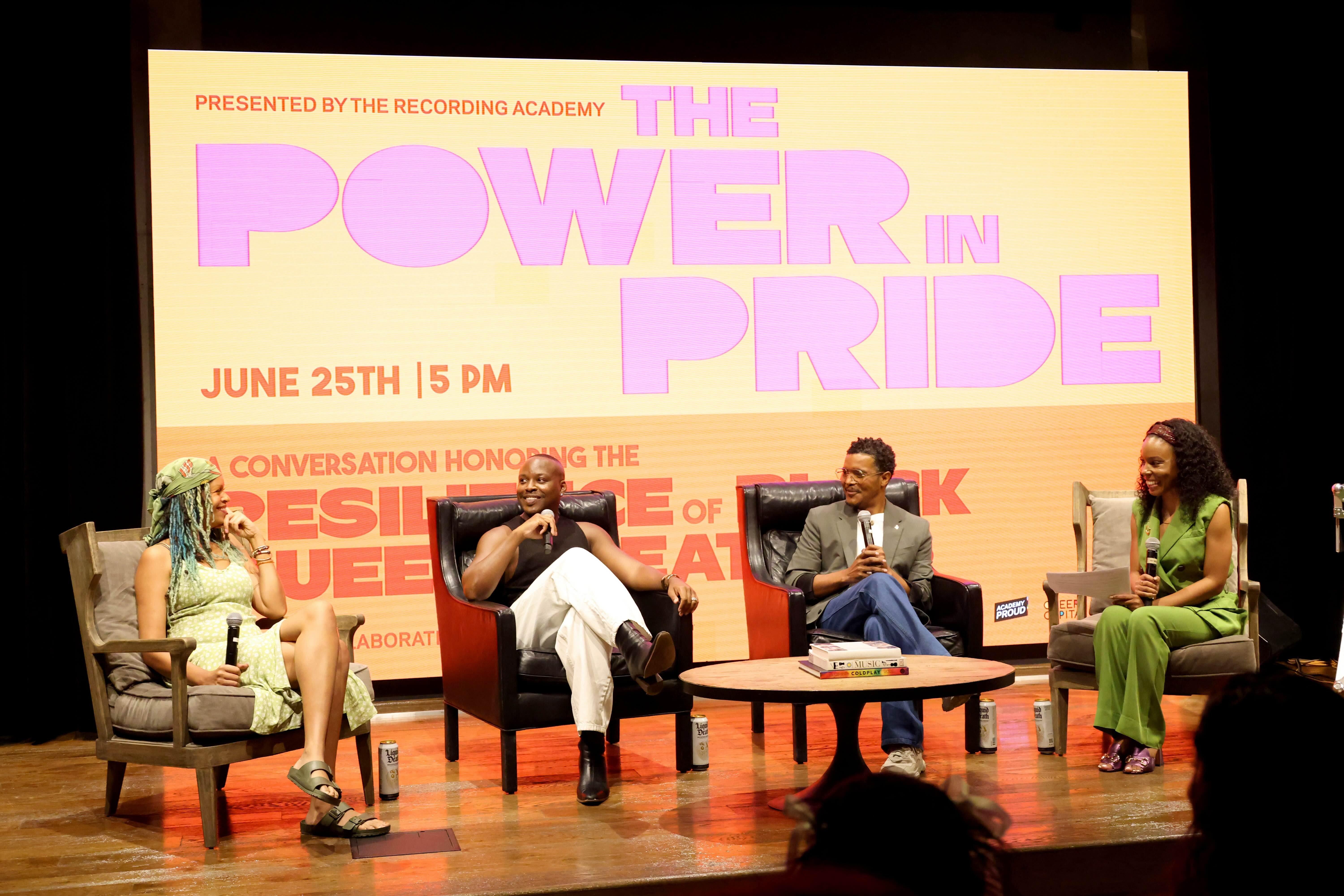Photo Courtesy of the Recording Academy

feature
How The HBCU Love Tour Inspires Young Black Students To Prosper In The Music Industry
Presented by the Recording Academy's GRAMMY U and Black Music Collective, the inaugural HBCU Love Tour motivates students to learn more about the Academy's aims and stake their claims in the music business.
On a vivacious afternoon back in April, the energy was positively crackling inside the Howard Theatre in Washington, D.C. From the first minute opening the event to the last seconds of the night, the energy level at the inaugural HBCU Love Tour event was enough to shatter the Richter scale. That's because the HBCU family from across the DMV came ready to learn from today's music industry's leaders.
The HBCU Love Tour, a joint initiative presented by the Recording Academy's GRAMMY U and the Black Music Collective, is a new program aimed at teaching young students and aspiring professionals attending an HBCU, short for historically Black college or university, about the music business and invite them to join GRAMMY U, the Recording Academy's membership program for college students. An entryway into the music industry, the HBCU Love Tour aims to open doors for young, gifted and Black students looking to make their mark in music and entertainment culture.
First, a little background for those who haven't been to the nation's capital. Howard Theatre is a historic spot dating back to 1910; it hosted many Black musical geniuses of the 20th century, from Sarah Vaughan to James Brown to Dionne Warwick. It's also near Howard University, where the majority of the HBCU Love Tour attendees are enrolled. Need proof? Every mention of "H.U." resulted in the saying's remainder, roared back by the audience: "You know!"
The launch of the HBCU Love Tour was a smashing success — you could feel the good vibes. Throughout the event, the throng of attendees, mostly college students, showed a palpable eagerness to learn the ropes of the music business, willing to engage with their entire hearts and minds and absorb that passed-down wisdom.
From Howard students and GRAMMY U affiliates Nia Burnley and Rainee Wilson to the Recording Academy's Vice President of Diversity, Equity & Inclusion Ryan Butler, everyone brought something to the table. (To say nothing of Precious Jewel, the first-ever HBCU Love Contest Winner and one of Howard University's own, who led off the night with a spellbinding performance.)
And throughout a long chat between recent 2022 GRAMMYs On The Hill honorees Jimmy Jam & Terry Lewis — as well as appearances by Recording Academy CEO Harvey Mason jr.; Chair on the Board of Trustees of the Recording Academy Tammy Hurt; and others — the crowd alternated between silent fascination and visceral enthusiasm.
But a big reason the HBCU Love Tour was so special was due to its radiant host: Rico Love, Vice Chair on the Board of Trustees of the Recording Academy and a two-time GRAMMY nominee.
Even while in conversation with a guest, Love wasn't afraid to break the fourth wall and address the crowd directly — the sign of an excellent moderator — whether he was extolling the virtues of MusiCares ("When you say, 'Forget the GRAMMYs,' you're saying, 'Forget all those people who need help!'") or Advocacy ("Unbeknownst to a lot of people, they're fighting for songwriters' rights!").
Love understands how the Recording Academy and its various initiatives can transform the lives of all music people and creators, including young, aspiring students. "Today was my first day on Capitol Hill doing Advocacy work, and I felt powerful," he said of his work at the 2022 GRAMMYs On The Hill earlier that week.
And in a panel between singer/songwriter Raheem DeVaughn, rapper Cordae and singer/songwriter Kacey Williams, moderated by Love, the realities of struggling in the music business in a pandemic age were laid bare — as well as ways to help ameliorate them.
"I think it's about understanding your worth," Williams, who fronts the band Black Alley, said, succintly summing up the entire theme of the event. "In order to be considered successful in a business, you need to understand what your business is worth."
Of course, songwriters, producers and other music creators hold their craft in high esteem — why else devote their lives to music? However, much of the world hasn't caught up, and it won't without a whole lot of passionate change.
The sheer number of mental seeds planted at the inaugural HBCU Love Tour that night — for a new generation of music people and creators set to lead the industry into the future — is more than enough to engender hope and ignite change.
So, let's keep that blessed feeling of the first-ever HBCU Love Tour in our back pockets as we continue to celebrate and support music and all its professionals and creatives. Whether they consciously know it or not, these students intuitively grasp what they're worth — and the world's about to find out.
Next Up: The HBCU Love Tour heads to Atlanta
Student Showcase
Vinyl at Center Stage
Sunday, Oct. 9, at 4 p.m. ET
Panel: Demystifying the GRAMMY Awards with J.I.D, Baby Tate, and Rico Love
GRAMMY U Masterclass with Armani White presented by Mastercard
Ray Charles Performing Arts Center
Monday, Oct. 10., at 4 p.m. ET
GRAMMY U members and students at Clark Atlanta University, Morehouse College, Georgia State University, and Spelman College are invited to attend. RSVP here.

Photo courtesy of the Recording Academy™️/photo by Timothy Norris, Getty Images© 2024.
news
Maren Morris On 20 Years Of GRAMMY Camp & Her Advice To The Next Generation Of Music Industry Professionals
Almost 20 years ago, a 15-year-old Maren Morris attended GRAMMY Camp, the GRAMMY Museum's signature music industry camp for U.S. high school students. This year, the GRAMMY-winning country superstar came full circle.
It's been decades since Maren Morris first attended GRAMMY Camp all the way back in 2005 — nearly 20 years ago. Still, she remembers precisely how she felt then and how much of a "rare opportunity" it was.
She met luminaries like Jimmy Jam and Paul Williams, and the setting made the then-15-year-old feel legitimized and creatively elevated. "I learned how to peer into myself and learn what unique thing I had to bring to the table musically," she tells the Recording Academy.
Since then, Maren Morris has had an entire career: She won a GRAMMY, received 17 GRAMMY nominations, joined the country music supergroup the Highwomen, topped the Billboard country charts, and much more.
Morris just had a full circle moment — Recording Academy style. On Monday, Morris returned to GRAMMY Camp, the GRAMMY Museum's signature music industry camp for U.S. high school students, as a guest artist to celebrate the program's 20th anniversary, which takes place in Los Angeles this week. She joins viral NYC bass phenom Blu DeTiger and captivating New Jersey singer/songwriter Jeremy Zucker. Together, they are guiding students on their paths to a career in the music industry.
"I think that the main thing I'm imparting is that they don't need to rush their art or building their fan base," Morris says. "With social media and trending sounds and dances every day, it's easy to feel like you're getting lost or not keeping up fast enough with what your peers are doing.
"Just stick to being authentic," she continues, "and people see that, no matter what time they arrive to the party for you."
Another one of Morris' pieces of advice: Don't confuse loyalty with complacency. She explains that she likes to "shake up my production or co-writing comfort by working with new people who bring things out of me I wouldn't normally in a more comfortable creative situation."
In the end, "Find people that listen to you," Morris concludes, "but also push you and your creativity to new areas of yourself." There's no place better to do exactly that than at GRAMMY Camp, where the mentee can one day become the mentor and guide the next generation of artists and music industry professionals.
The 20th annual GRAMMY Camp celebration is running now and concludes with the GRAMMY Camp Finale Student Showcase on Saturday, July 20, at the Ray Charles Terrace at the GRAMMY Museum.
Applications for GRAMMY Camp 2025 will be available online in September.
Explore GRAMMY Camp And The GRAMMY Museum

Graphic: Courtesy of the Recording Academy
news
2024 New Member Class: Music Creators & Industry Professionals React To Their Membership Invites On Social Media: “This Is Huge For Me And My People!”
The newly invited members took to social media to share their reactions to being invited to join the Recording Academy. The 2024 New Member Class invitees embody the Academy's dedication to mirroring the diverse and dynamic music industry landscape.
The Recording Academy, the organization behind the annual GRAMMY Awards, has proudly extended membership invitations to more than 3,900 music creators and industry professionals this week to join its 2024 New Member Class.
The 2024 New Member Class, which exemplifies the Academy's commitment to reflecting today's diverse and dynamic music industry landscape, represents a significant step towards inclusivity and representation within the music industry. This year's 2024 class of invitees is 45% women, 57% people of color and 47% under the age of 40. With these new member invitees, the Recording Academy is on track to achieve its goal of adding 2,500 women Voting Members by 2025, reaching this milestone a year ahead of schedule.
The deadline for accepting these invitations, and thus engaging in the full process for the 2025 GRAMMYs, is Wednesday, July 31. 2024 New Member Class invitees are encouraged to join our newly launched New Member Class broadcast channel to learn more about the Recording Academy and membership-related updates.
These invitations offer each potential new member an opportunity to power the Recording Academy's mission of cultivating the well-being of the music community, celebrating artistic excellence in the recording arts, advocating for creators' rights, investing in music's future through the GRAMMY Museum, and supporting music people in times of need through MusiCares.
The Recording Academy's membership invitation process is community-driven and peer-reviewed annually, focusing on two types of membership: Voting Membership for music creators and Professional Membership for music business professionals. Interested musicians and professionals must apply for membership by March 1 each year, and if approved by a peer review panel, they are invited to join the Recording Academy. (GRAMMY U is the third type of Academy membership and follows a distinct application process.)
To celebrate this milestone, many of the newly invited members have taken to social media to express their excitement and gratitude. Here are some highlights:
For more information about the 2025 GRAMMY Awards season, learn more about the annual GRAMMY Awards process, read our FAQ (Frequently Asked Questions) section, view the official GRAMMY Awards Rules and Guidelines, and visit the GRAMMY Award Update Center for a list of real-time changes to the GRAMMY Awards process.
Recording Academy: Latest News & Updates

(L-R) Aluna, Bryant Von Woodson II, Ryan Butler and Tiffany Briggs-Low speak onstage during the Power in PRIDE event
news
The Power In Pride: A Conversation Honoring The Resilience Of Black Queer Creatives With A Candid, Intersectional Discussion For Pride Month
At New York's Live Nation office, the Recording Academy's Vice President of Diversity, Equity and Inclusion, Ryan Butler, sat down with Queer Capita's Bryant K. Von Woodson II and DJ/musician Aluna for a nuanced Pride Month conversation.
"Everything you like was created by a queer person," musician and DJ Aluna proclaimed near the end of "The Power In Pride: A Conversation Honoring The Resilience Of Black Queer Creatives." (A seemingly bold statement — until you do some digging.)
Ditto a Black person. As the Recording Academy's VP of DEI, Ryan Butler, pointed out, just about every American music genre flows back to that source. "There is no pop music in America that is not a derivative of the Negro spiritual," he said across from Aluna.
"The queerness has been the innovation in it, but the Black community has been the foundation of it," Butler concluded. "So, I think when you have the foundation and the innovation together, it's worth celebrating 365 days a year."
When considering those two truths, two more truths emerge. First, without the contributions of Black and queer people, our world — including our musical landscape — would be unrecognizable. Second, to celebrate only in February, for Black History Month — or June, for Pride Month and Black Music Month — would be a grave disservice to both wellsprings of genius. Honoring Black and queer creators, as Butler pointed out, requires the entire calendar year.
These themes were paramount at "The Power of Pride," a candid conversation at the Live Nation building in Manhattan, just as summer kicked off. Tiffany Briggs Low, the Director of Corporate and Communications at Live Nation, moderated the discussion between Butler, Aluna, and third panelist Bryant K. Von Woodson II, VIP Relations at Chapter 2 Agency and Head of Communications at Queer Capita. Von Woodson II introduced himself as a "curator of people" who connects BIPOC folks with crucial opportunities; Butler, as an "angelic disruptor"; Briggs-Low called Aluna "our sister in green" and "the curator of the vibes."
Briggs-Low kicked off the conversation with a heavy, dual prompt: "I would love to hear about why you feel it's important for the world to continue celebrating both Pride and Black Music Month, and what does the intersectionality of Black and queer identities mean to each of you?"
"I think that theme months each year do serve as a reset," Aluna stated, "and have you looking internally, and looking at what you've done and haven't done, and how you feel. To me, the queer community and the Black community have given so much," she continued, "and my mission is for us to just turn that around — to be giving it back to ourselves. Because there is an abundance of things that we create — and we never stop creating — but we need to be fed, and the well is running dry. And that upsets me."
To Aluna — who is Black, straight, and an ally of the Black queer community — this nourishment comes from "creat[ing] space" within these communities, and fostering "spirituality and deep, deep connection."
To that question, Von Woodson II — who is Black and queer — paraphrased Maya Angelou: "Between both communities, I stand as one, but I also really acknowledge the 10,000," he said referring to the philosophy from Angelou's work that credits the collective experiences of communities and ancestors who came before.
"I think that's what this month is about," he continued. "Celebrating the 10,000 that got me to be able to sit on this stage, to have this conversation with you, to sit up here with some beautiful Black people, and really speak about our lives and ourselves."
Butler, who is also Black and queer, calls that intersection "a superpower." Yet the world doesn't always treat it as such — to put it lightly. As Butler related, just last weekend, he entered a function in Malibu, where the host said, "I'm going to sit you at the table where all the rappers like to sit."
"I don't really give rapper," Butler mused dryly. "You shouldn't be profiled in that type of way, and I definitely experience it in the corporate environment, still. I don't think that it always feels like a safe space.
"But that's also a litmus test for me," he added. "I know that there are other [people] who may feel this way, and so it also helps me make sure that I'm constantly applying pressure."
Von Woodson II expounded on the importance of being his authentic self, in spaces that might stifle that. "There is no hiding that I am clearly Black, but also queer," he said, before showing off his proudly flamboyant style of walking into a room.
"As I work with my clients, and I work with new people, I think I show up as authentic as I can," he continued. "And I just lay it on them and say, 'You either take it or you don't.'"
Aluna, for her part, highlighted the unfairness of Black artists being pigeonholed as featured artists.
"If I need to be an example of what's possible for the next generation, they can't just see me as Disclosure featuring Aluna, DJ Snake featuring Aluna, Avicii featuring Aluna, because that gives the message that that's all we're worth," she said. "You can't get booked as an artist in your own right, because they just don't see you as an artist.
"Managers across the board, bookers, labels — they're just hankering after your essence, your soul," Aluna continued. "But without your Blackness."
In supporting Black and queer communities — which takes a plethora of forms, for all different kinds of people — Butler warned against performative gestures. Aluna decried "the colonial separation between Blackness and queerness."
And Butler left the audience with a truth bomb: "There are going to be times where you are going to have to shield me with your privilege that I don't have."
But for all these heavier-than-heavy topics of identity, justice and belonging, "The Power In Pride" felt celebratory and familial. As the conversation wound down, the beats were turned up, and the audience was geared to get out and uphold Black and queer genius and solidarity — 365 days a year.
The Recording Academy thanks its partners — Live Nation and Queer Capita — for their efforts to make this event possible.
Latest Recording Academy News & Initiatives
.jpg)
Image courtesy of the Recording Academy
news
The Black Music Collective Presents "Your Future Is Now" Scholarships To HBCUs
Two $10,000 donations were made to Pensole Lewis College and Fayetteville State University, in order to bolster their music equipment and music programs alike.
The Black Music Collective — the Recording Academy’s hub for genre-spanning power players in Black music — is back with its “Your Future Is Now” program!
For its fourth year, the BMC and Amazon Music have once again collaborated to provide a thrilling scholarship opportunity for students at Historically Black Colleges and Universities (HBCUs), who comprise the next generation of movers and shakers in the music industry.
Since its establishment in 2021, the “Your Future Is Now” scholarship has made great strides in mentorship opportunities and donations to HBCU students and music programs.
This year, the BMC has awarded five students from HBCUs $10,000. Additionally, they awarded two HBCUs $10,000 grants each to purchase equipment for their music programs, enhancing the learning experience for current and future students.
In September 2023, Amazon Music and the Recording Academy's Black Music Collective collaborated on a $10,000 grant to Pensole Lewis College in Detroit, Michigan, delivered in the form of a check presentation event. And two months ago — on April 5 — the two entities presented a $10,000 check to Fayetteville State University in Fayetteville, North Carolina. Both go directly toward their music programs and the music equipment used therein.
At Pensole Lewis College, Ricky Lyon, the Manager of Diversity, Equity and Inclusion at the Recording Academy, presented the check to the university.
The Recording Academy also worked with the college on a custom shoe design to elevate and promote news of the donation, and highlight Pensole's student design program — at the 2024 RA Honors event, a student design was chosen and showcased.
At Fayetteville State, Ryan Butler, the Vice President of Diversity, Equity and Inclusion at the Recording Academy, presented the check to the university's Vice Chancellor, Omar Bell. This was in parallel with the Dreamville Music Festival, which was live streamed by Amazon Music.
Congratulations to the recipients of these two generous grants, and keep checking the Recording Academy's website — for more news regarding the BMC and beyond.
Build Your Financial Foundations With The Recording Academy & MusiCares
